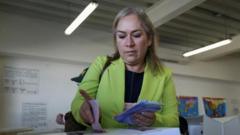Following the removal of Bashar al-Assad, Syrians celebrate their hard-won liberties, but rising concerns point to the fragility of democracy and possible radical influences that could threaten their freedom.
Transitional Hopes: Syria's New Era of Freedom and Its Fragile Future

Transitional Hopes: Syria's New Era of Freedom and Its Fragile Future
As Syria navigates a post-Assad realm of newfound freedoms, questions arise about the sustainability of democracy and the potential for regressive influences under the new regime.
On December 8, 2024, as I stood at the Lebanese border, apprehensively waiting to cross into Syria, I sensed the weight of monumental change. The enduring presidency of Bashar al-Assad was officially ended. Opposition forces had surged towards Damascus, capturing significant cities like Aleppo, signaling an unexpected turn in the country’s tumultuous history. In that moment, it felt as if Syria had finally grasped the concept of freedom.
For most Syrians, including myself, the Assad regime was a life marked by repression and fear, spanning over five decades. From continuous disappearances to brutal civil war that erupted in 2011, the legacy of oppression has been deeply felt. I had my own experiences of detention back at the start of the uprising in 2011, an ordeal that often involved horrifying sightings of torture. When I fled the country in 2013, I believed my homeland had slipped away from me forever; yet, in a stunningly short span of time last year, the dictatorship fell.
Crossing the border felt unreal; it was akin to a dream where celebrations sparked all around me. Rebel fighters fired celebratory shots in the air as supporters gathered to rejoice in the streets. Umayyad Square in Damascus soon transformed into a hub for jubilant discussions about Syria’s future—a stark contrast to the oppressive silence enforced under the Assad regime, where political expression was a dangerous act.
However, just four months into this new chapter, it became clear that the landscape was more intricate than anticipated. Although social freedoms have expanded, anxiety looms about the evolving structure of democracy and the possible imposition of religious influence in governance. Many are now questioning how long these newly attained liberties can endure.
As I ventured into Rawda Café, juxtaposed against the backdrop of Parliament, the atmosphere was palpably different. Gone were the days of whispered conversations punctuated by fear. Now, intellectuals gathered freely to engage in discussions about culture and politics, an unthinkable act under Assad. Prominent figures, long exiled, have returned to partake in this budding new society, greeting one another with enthusiasm and traditional music.
Mohammad Ghannam, a journalist who had spent countless months imprisoned during the Assad era, expressed profound joy at his return. "Everyone who can return should come back to help rebuild," he said, highlighting a renewed sense of collective responsibility, a rare sentiment since December 8, 2024.
The dissolution of censorship has allowed books—once banned—to grace the shelves of local shops, inviting curiosity among a population eager for knowledge. Cinema clubs are privy to screenings of previously confiscated films, marking a revival of the arts that flourished but faltered under authoritarian rule. Musicians and artists have united to safeguard this cultural renaissance, yet another struggle looms: the complex interplay between artistic freedom and the potential imposition of Islamic law.
Ahmed al-Sharaa, appointed as the interim president after leading the rebel forces against Assad, seeks to fill the power vacuum left behind. Nevertheless, doubts hover regarding the establishment of a durable democracy. Some voices assert that the newly formed government continues operating through old patterns of power dynamics instead of genuinely including diverse societal influences.
Recent national dialogue meetings aimed at shaping Syria's future sparked criticism, with many believing they failed to encompass the breadth of public sentiment. Observers remain cautious, citing a pressing need for inclusive governance to foster a sense of legitimacy. Yet, with positions of influence awarded to many former leaders of militant groups, anxieties surrounding potential authoritarian tendencies persist.
Moreover, women's rights and religious freedoms, once guaranteed to a degree under Assad, are at risk of being redefined. Concerns continue to emerge about the marginalization of women in public life, particularly with reports hinting at the enforcement of conservative religious ideals that may hinder their progress.
Meanwhile, the socio-political fabric in Syria remains fragile, with pockets of violence still prevalent and the specter of poverty hanging heavy. The ongoing struggle for legitimate governance raises daunting questions about the road ahead. As various factions assert differing visions for Syria’s future, the clash between evolving ideologies grows palpable.
Ultimately, the questions standing at the forefront are whether the gains in freedom can endure and if Syrians are prepared for a future that may still resemble the troubled past. For many, the fear of returning to a dictatorial regime still lingers, and a collective yearning for democracy, stability, and equality remains, albeit tangled in uncertainty.
As the landscape shifts, the determination of the Syrian people to assert their rights and liberties will play a pivotal role in carving a new path forward amidst their lessons learned from years of struggle. The fate of their newfound freedoms hangs delicately in the balance, reinforcing the truth that while the fight for democracy has only just begun, it may face significant challenges ahead.




















